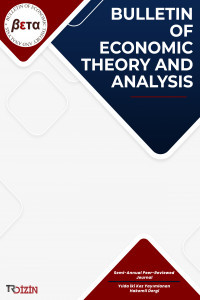Türkiye’de Doğrudan Yabancı Yatırım Döviz Kuru İlişkisi Üzerine Bir Uygulama
Döviz Kuru, Doğrudan Yabancı Yatırımlar, Engle-Granger Eşbütünleşme Testi, Hendry Model, Exchange Rate, Foreign Direct Investment, Engle- Granger Cointegration Test, Hendry Model
An Application on Foreign Direct Investment Exchange Rate Relationship in Turkey
Exchange Rate, Foreign Direct Investment, Engle- Granger Cointegration Test, Hendry Model,
___
- AÇIKALIN, Süleyman. 2007. “Türkiye’de Doğrudan Yabancı Yatırımların Seçilmiş Makroekonomik Göstergelerle İlişkisinin Zaman Serisi Analizi”. Anadolu Üniversitesi Sosyal Bilimler Enstitüsü.
- ALAGÖZ, Mehmet, Savaş ERDOĞAN, ve Nurgün TOPALLI. 2008. “Doğrudan Yabancı Sermaye Yatırımları ve Ekonomik Büyüme: Türkiye Deneyimi 1992-2007”. Gaziantep University Journal of Social Sciences 7 (1): 79-89.
- AK, Mehmet Zeki. 2009. “Gelişmekte Olan Ülkelere Yönelik Doğrudan Yabancı Yatırımların Temel Belirleyicileri”. Sakarya Üniversitesi Sosyal Bilimler Enstitüsü.
- ARSLAN, Salih, ve Macide Çİ ̇ÇEK. 2017. “Yabancı portföy Yatırımları ile Döviz Kuru İlişkisi: Türkiye’de Yabanc Sermayenin Vergilendirilmesi”. Uluslararası Yönetim İktisat ve İşletme Dergisi 13 (5): 292-299-299. https://doi.org/10.11122/ijmeb.2014.13.5.1818.
- Başar, Selim, ve Fuat Lebe. 2008. “Doğrudan Yabancı Yatrımların Dışlama Etkisi: Türkiye Üzerine Bir Uygulama”. Tisk Akademii 3 (6): 17.
- CAMBAZOĞLU, Bı̇ rgül, ve Sevcan GÜNEŞ. 2016. “The Relationship Between Foreign Exchange Rate and Foreign Direct Investment in Turkey”. Economics, Management & Financial Markets 11 (1): 284-93.
- ÇÜTÇÜ, İbrahim, ve Enez KAN. 2018. “Doğrudan Yabancı Sermaye Yatırımlarını Etkileyen Faktörler: Türkiye Örneği”. Sakarya İktisat Dergisi 7 (3): 21.
- DİCKEY, David A., ve Wayne A. FULLER. 1981. “Likelihood Ratio Statistics for Autoregressive Time Series with a Unit Root”. Econometrica 49 (4): 1057-72. https://doi.org/10.2307/1912517.
- DİCKEY, David Alan, ve Wayne Arthur FULLER. 1979. “Distribution of the Estimators for Autoregressive Time Series with a Unit Root”. Journal of American Statistical Association 74 (366).
- DÖKMEN, Gökhan, ve Ahmet AYSU. 2010. “Hükümet İstı̇krarinin Doğrudan Yabanci Yatirimlar Üzerı̇ndekı̇ Etkı̇sı̇: Gelı̇şmekte Olan Ülkelere İlı̇ Şkı̇n Ampı̇rı̇k Bı̇r Çalişma”. Journal of Yasar University 5 (18): 3028-37.
- Engle, R. and Granger, C. (1987) Cointegration and Error Correction: Representation, Estimation and Testing. Econometrica, 55, 251-276.
- ERÜNLÜ, Zeynep. 2018. “Do Depreciations Really Trigger an Inflow of Foreign Direct Investment? The Case of Turkey”. Döviz Kuru Doğrudan Yabancı Yatırım Girişini Gerçekten Tetikler mi? Türkiye Örneği. 26 (Temmuz): 257-72. https://doi.org/10.17233/sosyoekonomi.2018.03.15.
- GOTTSCHALK, Sylvia, ve Stephen HALL. 2008. “Foreign Direct Investment and Exchange Rate Uncertainty in South-East Asia”. International Journal of Finance & Economics 13 (4): 349-59. https://doi.org/10.1002/ijfe.355.
- HENDRY, David F., ve Jean-Francois RİCHARD. 1983. “The Econometric Analysis of Economic Time Series”. International Statistical Review / Revue Internationale de Statistique 51 (2): 111-48. https://doi.org/10.2307/1402738.
- KİYOTA, Koza, ve Shujiro URATA. 2004. “Exchange Rate, Exchange Rate Volatility and Foreign Direct Investment” 27 (10). https://onlinelibrary.wiley.com/doi/pdf/10.1111/j.1467-9701.2004.00664.x.
- LEBE, Fuat, ve Mustafa ERSUNGUR. 2011. “TÜrkiye’de Doğrudan Yabancı Sermaye Yatırımını Etkileyen Ekonomik Faktörlerin Ampirik Analizi”. Atatürk Ü. İİBF Dergisi, 19.
- KİM, Haksoon. 2010. “Political Stability and Foreign Direct Investment”. https://doi.org/10.5539/ijef.v2n3p59.
- KUTLAR, Aziz. 2005. Uygulamalı ekonometri. Nobel Kitabevi.
- LEE, Jung Wan. 2015. “Dynamic Relationships between Exchange Rates and Foreign Direct Investment: Empirical Evidence from Korea: Exchange Rates and Foreign Direct Investment”. Asian Economic Journal 29 (1): 73-90. https://doi.org/10.1111/asej.12048.
- MORRİSSEY, Oliver, ve Manop UDOMKERDMONGKOL. 2008. “Foreign Direct Investment and Exchange Rates: A Case Study of US FDI in Emerging Market Countries by”.
- SEVÜKTEKİN, Mustafa, ve Mehmet NARGELEÇEKENLER. 2007. “Finansal Faktörlerin Reel Para Talebi Üzerindeki Rolü: Türkiye Örneği”. Balıkesir Üniversitesi Sosyal Bilimler Enstitüsü Dergisi 10 (18): 45-61
- Pagan A. (1987). Journal of Economic Surveys. Volume 1
- TCMB. 2003. “Reel Efektif Döviz Kuru”. 2003. https://www.tcmb.gov.tr/wps/wcm/connect/02713545-8428-49ab-a9d9- 138
- TCMB. EVDS. Türkiye'deki Özelleştirme Gelirleri https://evds2.tcmb.gov.tr/index.php?/evds/serieMarket/#collapse_2
- TCMB. Evds. Türkiye'ye Gelen Doğrudan Yabancı Yatırımların Bölgeler İtibariyle Dağılımı (https://evds2.tcmb.gov.tr/index.php?/evds/serieMarket/#collapse_2
- TCMB. EVDS. Türkiye'ye Avrupa Ülkelerinden Gelen doğrudan Yabancı Yatırımlar https://evds2.tcmb.gov.tr/index.php?/evds/serieMarket/#collapse_2
- TOPAL, Mehmet Hanefi, ve Özlem S. GÜL. 2016. “Ekonomı̇k Rı̇sk İle Doğrudan Yabanci Sermaye Yatirimlari Arasindakı̇ İlı̇şkı̇: Türkı̇ye Örneğı̇”. Gümüşhane Üniversitesi Sosyal Bilimler Enstitüsü Elektronik Dergisi 7 (15): 229-47. https://doi.org/10.17823/gusb.297.
- YASED. 2018. “Uluslararası Doğrudan Yatırımlar 2017 Yılsonu Değerlendirme Raporu (Mart 2018)”. 2018.
- http://www.yased.org.tr/ReportFiles/2018/2017_Yılsonu_Raporu_final.pdf. VALERİEVNA, Matraeva Lilia, ve Solodukha Petr VİKTOROVİCH. 2018. “Foreign Direct Investments Impact on Economic Growth in Developing Countries”. TEM Journal 7 (4): 731-37. https://doi.org/10.18421/TEM74-05 . WAFURE, Obida Gobna, ve Abu NURUDEEN. 2010. “Determinants of Foreign Direct Investment in Nigeria: An Empirical Analysis”. Global Journal of Human-Social Science Research 10 (1). https://www.socialscienceresearch.org/index.php/GJHSS/article/view/7.
- Yayın Aralığı: Yılda 2 Sayı
- Başlangıç: 2016
- Yayıncı: Mehmet SONGUR
Cemre Eda ERKILIÇ, Ercan ÇULHA
Testing the Armey Curve Hypothesis in Turkey: Evidence from the Provincial Data
Dış Borç Yatırımlar İçin Önemli mi? Türkiye’den Kanıtlar
Metaverse Dünyasında Muhasebe Denetiminin Geleceğine Yönelik Bir Değerlendirme
Sermaye Yapısı ve Firma Performansı İlişkisi: BIST Ana Metal Sanayi Sektörüne Yönelik Bir Analiz
Financial Inclusion and Income Inequality: An Evaluation on Cause-and- Effect Relationship
Aylin ABUK DUYGULU, Mehmet ÖZYİĞİT
Türkiye’de Doğrudan Yabancı Yatırım Döviz Kuru İlişkisi Üzerine Bir Uygulama
Elif ASLAN, Pelin KARATAY GÖGÜL
Kamusal Alan: Gelişimi, Habitus ve Dönüşümler (Cemaat, Marjinallik)
